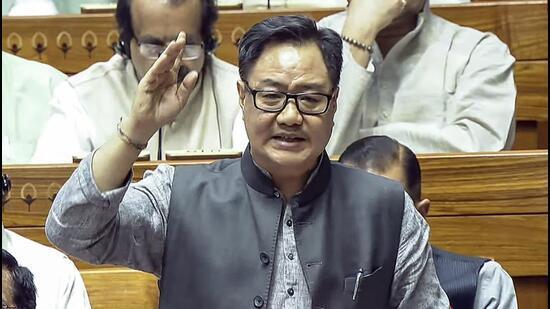
Opposition Creates Confusion & Leaves House: Rijiju in Rajya Sabha
The Indian Parliament has been a hub of intense debates and discussions on various bills and issues. Recently, Union Minister Kiren Rijiju sparked off a controversy by criticizing senior Rajya Sabha members for creating confusion and raising issues in the House but not staying back to listen to the replies. The incident occurred during the discussion on the Waqf (Amendment) Bill, which aimed to simplify the process of acquiring properties for Waqf bodies.
Rijiju’s remark was specifically directed towards MP Kapil Sibal, who had compared the properties of Waqf bodies with those of other religious bodies. Sibal’s comparison was seen as an attempt to create confusion among the members, and Rijiju did not hesitate to point this out. The Union Minister stated that Sibal’s remarks were designed to create confusion, and he was not willing to listen to the replies from the government side.
The Waqf (Amendment) Bill was introduced in the Rajya Sabha with the aim of simplifying the process of acquiring properties for Waqf bodies. The bill aimed to empower Waqf bodies to acquire properties without the need for government approval. The bill also aimed to streamline the process of appointing trustees and ensuring transparency in the management of Waqf properties.
However, the opposition parties, including the Congress, raised several objections to the bill. They claimed that the bill was designed to benefit a particular community and that it would lead to the erosion of social harmony. The opposition parties also claimed that the bill was being rushed through the Parliament without proper consultation with stakeholders.
Rijiju’s criticism of Sibal and the opposition parties came during the discussion on the bill. The Union Minister stated that the opposition was trying to create confusion by raising irrelevant issues and not willing to listen to the government’s replies. He accused Sibal of making false allegations and trying to mislead the House.
The opposition parties, however, refuted Rijiju’s claims and stated that they were raising legitimate questions about the bill. They claimed that the government was not willing to engage with them and that the bill was being pushed through the Parliament without proper consultation.
The controversy surrounding the Waqf (Amendment) Bill is not the first instance of opposition parties creating confusion in the House. In recent times, there have been several instances where the opposition parties have raised issues and then walked out of the House without listening to the government’s replies.
The incident highlights the need for the opposition parties to engage in constructive debates and discussions in the House. By raising legitimate questions and staying back to listen to the government’s replies, the opposition can play a crucial role in holding the government accountable and ensuring that the interests of all stakeholders are protected.
In conclusion, Rijiju’s criticism of Sibal and the opposition parties is a reminder of the importance of constructive debates and discussions in the House. The opposition parties must refrain from creating confusion and raising irrelevant issues. Instead, they must engage in constructive debates and discussions, and stay back to listen to the government’s replies.




